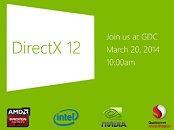Wednesday, March 5th 2014

Microsoft to Talk DirectX 12 at GDC
Microsoft will present its first paper on DirectX 12, its next-generation multimedia API, at the Game Developers Conference (GDC), on the 20th of March, 2013. The event could include presentations by NVIDIA, AMD, Intel, and Qualcomm. It's not clear at this point if Microsoft will release developer tools and resources on that day, or simply outline the API to spur interest. If anything, it should gently nudge today's GPU manufacturers to make their future GPU designs ready for the API. There are currently no GPU families that we know of, which support DirectX 12. AMD's current Graphics CoreNext 2.0 GPUs, such as the Radeon R9 290X, support DirectX 11.2, while NVIDIA's "Maxwell" GPUs, such as the GeForce GTX 750 Ti, feature an identical API feature-level support to their "Kepler" predecessors.
Source:
MSDN

63 Comments on Microsoft to Talk DirectX 12 at GDC
My Next Video card nVidia GTX with DX12
Ha, there goes all of my sarcasm for the week, if you come across me chewing some retard out, that's why.
As far as forcing it. I would be more incline to believe #1 Android and #2 Sony PS4 beating MS X-Box One in sales and performance has more to do with it. The fact that Qualcomm is there is a signal of the market MS wants to include in the future.
DX introduced 64bit in 2005 and we barely started seeing games being 64bit capable in the pass year almost a decade since its intro. People still complain about DX 9 compatibility with drivers that's 2002 WinXP.
Unless Microsoft pulls a Vista/DX10 and DX 12 is not backwards compatible game developers will do very little to take advantage of it.
Also, here is a coupon for some mediocrity to seal the deal."
Sony will milk the console situation, but on the side, they will continue to push out 4K TVs, and may even provide some competition with Oculus Rift on the VR spectrum of the market. I know Sony will have a refresh version of it's VR headset. It will probably be released in a few months besides 4k TVs at 60p versus the current 30p. Competition will escalate when Oculus Rift starts coming out with non-developer version of their VR headset, and maybe even 4K versions of it. You know since Sony is the main company that's pushing 4K TV, they will eventually push a 4K VR headset when they can refine it... Sony's VR headset does 1080p, 24p true. For $1,000 a pop, it's not bad. I happen to have one, and even though it doesn't have head tracking like the Oculus Rift Developer's version, picture quality and fluidity is worth the premium price. Played some Planetside 2 with. It's pretty sweet, but it would be nice to have head-motion tracking in it when I am flying a VS Scythe. Oculus Rift will probably get even more popular when Star Citizens is released in 2015. Sony will probably invest in that area in some way.
MS will most likely talk about D3D12.0, and push refresh of all it's other, new, revised products (Office, Access, Visio, etc...). Since XBone seems to have issues over the PS4, this is probably MS's way of mis-directing attention away from XBone's performance on the market.If NVidia knew about it, AMD probably knews about it too... If Intel continuous venturing in to the SOC market, they probably knew about it too... AMD has been pushing for DX11.1 and 11.2 APIs in two generations... In addition, they've been pushing DP and mini-DP usage besides the HDMI and DVI outlets. All your old 600 series NVidia cards weren't using DP. NVidia is now using Directcompute in it's 700 series Cards. A feature that's been known in the AMD cards for the past few generations.
If Microsoft has a graphics API that is lower to metal, that gives their Windows Phones (due to being so tightly hardware controlled) a gaming advantage over their Android and iPhone competitors who are still just using OpenGL ES. It allows Microsoft to squeeze more performance out of less hardware - the exact thing every mobile phone maker is trying to do.
And don't forget the Oculus Rift. Good times ahead.:rockout:
However, I have a feeling this has something to do with AMD Mantle